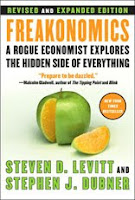Steven Levitt : Geoengineering goes mainstream


Geoengineering Goes Mainstream
By STEVEN D. LEVITTThe MIT Technology Review — one of my favorite magazines –
writes about geoengineering in the January/February 2010 issue. Much of what is said in the article will be familiar to people who have read SuperFreakonomics, but it also talks about carbon capture, which we didn’t discuss much.
The more I have thought about these issues, the more I have become convinced that carbon capture is going to end up being the centerpiece of long-term geoengineering solutions. There are good reasons to be optimistic that in 50 to 100 years we will be able to remove carbon dioxide from the air for one-thousandth or one-millionth the current costs. While that may seem fanciful at first blush, think about the rate of increase in computing speeds over the last 30 years, for instance. If carbon capture will get cheap and scalable, then the current focus on reducing carbon dioxide emissions (as opposed to keeping the temperature of the earth stable via geoengineering in the short run until carbon capture becomes routine) looks misguided. I suspect that with the failure more or less of Copenhagen (surprise, surprise), we will be hearing more and more about geoengineering.
Steven D. Levitt
- Bestselling Author, FREAKONOMICS and SUPERFREAKONOMICS
- FREAKONOMICS Spent Over 2 Years on The New York Times Bestseller List, With More Than 4 Million Copies Sold Worldwide
- The Popular FREAKONOMICS Blog is Hosted Exclusively on The New York Times Website
Co-Author of the Phenomenal Bestselling Business Book FREAKONOMICS, and Winner of the highly esteemed John Bates Clark Medal, as the most influential economist in America under the age of 40, Steven D. Levitt not only discusses the financial crisis in simple terms that anyone can understand, he also works with businesses to apply his FREAKONOMICS approach (combining data, economic theory, and unorthodox thinking) to the business world.
SUPERFREAKONOMICS, the highly anticipated follow-up to FREAKONOMICS was released on October 20, 2009. SUPERFREAKONOMICS offers an entirely new set of lessons to be learned. The book will delve into the biggest issues of our time, such as healthcare, terrorism, global warming, the current financial crisis, and much more. A full-blown media and book tour will begin in October and Steven Levitt, along with co-author Stephen Dubner, will be featured on some of the nation's most watched programs, such as Good Morning America, 20/20, Charlie Rose, and many more, as everyone wants to hear what new wisdom will be revealed in SUPERFREAKONOMICS!
FREAKONOMICS: Unconventional Thinking for an Unpredictable Economy
Levitt talks about the importance of using unconventional thinking to address the pros and cons of your current business model and how to succeed as well as excel in the midst of the current economic crisis. He works with business audiences to apply his FREAKONOMICS approach (combining data, economic theory, and unorthodox thinking) to the business world and how this type of creative, out-of-the box thinking can help businesses shine in an unstable market. Steve Levitt shows audiences that economics (and ultimately business) is about incentives - how people can get what they want or need, especially when other people want or need the same thing.
SUPERFREAKONOMICS
Steven Levitt's engaging and illuminating unconventional wisdom continues with his SUPERFREAKONOMICS presentation, which delves deeper into topics as divergent as terrorism, global warming, healthcare and the economy. Offering new insight into some off the most interesting chapters of SUPERFREAKONOMICS, Steven Levitt will captivate your audience from start to finish.
A Rogue Economist
The Wall Street Journal has said, "If Indiana Jones were an economist, he'd be Steven Levitt." When Stephen Dubner (co-author of FREAKONOMICS) profiled Levitt in The New York Times Magazine, he was beset by questions, queries, riddles and requests - from General Motors and the New York Yankees to U.S. senators but also from prisoners and parents and a man who sold bagels. A former Tour de France champion called him to ask his help in proving that the current Tour is rife with doping; the Central Intelligence Agency wanted to know how Levitt might use data to catch terrorists. Winner of the highly esteemed John Bates Clark Medal, as the most influential economist in America under the age of 40 (which is frequently a precursor to the Nobel Prize), Mr. Levitt has an enormous curiosity and is set on course by personal experiences and the incongruities he sees in everyday life. He is an intuitionist. He sifts through a pile of data to find a story that no one else has found and devised ways to measure an effect that veteran economists have declared unmeasurable. He has shown other economists just how well their tools can make sense of the real world.
The FREAKONOMICS Phenomenon
The No. 1 business book hit the bestseller lists on its first day in print and continues to be phenomenally popular in the U.S., Europe, Canada, and around the world, selling over 4 million copies worldwide. FREAKONOMICS has introduced to the world a new way of thinking – a way of getting beneath the surface of modern life – and the title itself has become a catchphrase spoken everywhere from college campuses to corporate boardrooms. The book has won numerous awards and is now being made into a TV show and a documentary film; its way of thinking also lives on the popular FREAKONOMICS blog, which has been called “the most readable economics blog in the universe,” and is hosted exclusively on the The New York Times website. Levitt and Dubner's unconventional wisdom continues with SUPERFREAKONOMICS, which was released on October 20, 2009.
source: New York Times
TV program : Management Hosted by Charley Rose interview


Comments